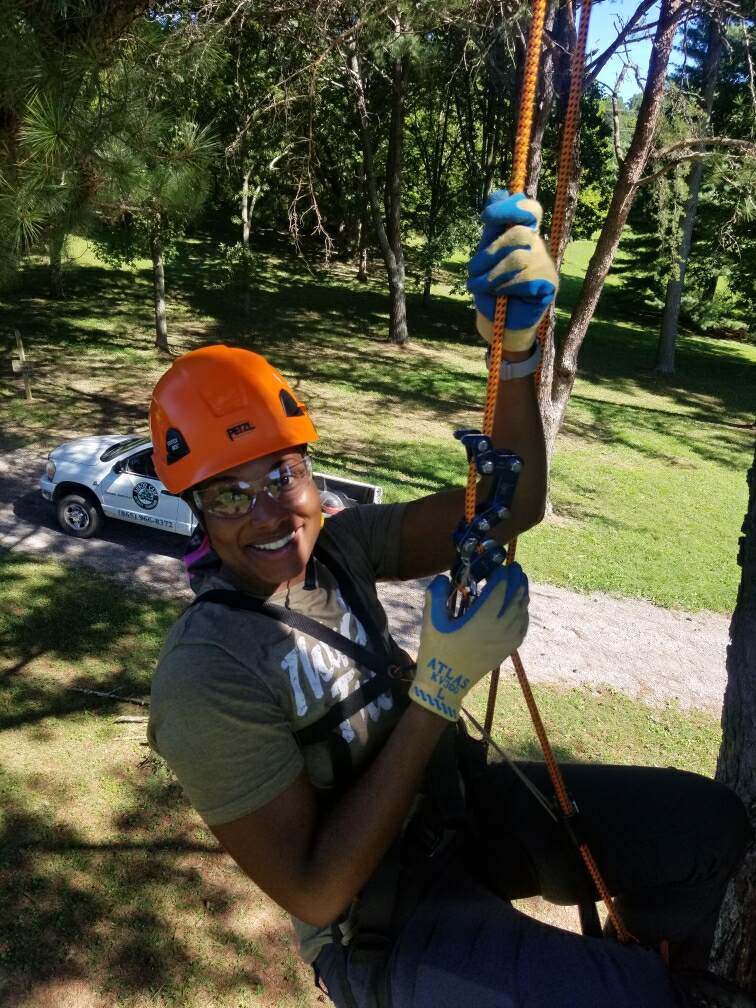SAF Member Spotlight: Dr. Sharon Jean-Philippe
August 17, 2022

Photo courtesy of Sharon Jean-Philippe
On a semi-monthly basis, SAF hosts a member spotlight that showcases the critical work being done by someone in our professional community. Through the month of August, SAF is also celebrating the importance of urban forestry in fostering a more just and sustainable future. Pulling these themes together, we have the honor of putting the member spotlight on Dr. Sharon Jean-Philippe, who is a Professor of Urban Forestry and the Urban Forestry State Extension Specialist at the University of Tennessee Knoxville. Dr. Jean-Philippe is also one of the newest members of SAF’s Committee on Forest Policy. In this interview, we asked Dr. Jean-Philippe to talk with us about her path into the profession, what inspires her about the field, and the work she’s been doing with SAF.
Could you elaborate about your time working with and supporting SAF? Feel free to share what you have worked on and what excites you.
As a faculty advisor, I understand when students are introduced to professional organizations, through workshops and conferences, students are exposed to leaders in the field that enhances their learning, network with peers, and acquire knowledge to obtain a job within their field of study. SAF provides these great touchpoints for students to learn, network, meet leaders and grow within the profession of forestry.
Could you provide a brief history of your professional career in forestry? What brought you into forestry and what has inspired you over the years?
In 2010, I started as an Assistant Professor of Urban Forestry (75% Teaching and 25% Research) in the Department of Forestry, Wildlife and Fisheries. I was charged with developing the new urban forestry concentration for students majoring in forestry, wildlife, and fisheries; and developing an urban forestry research program, with an emphasis on environmental, economic, and social benefits of healthy and diverse urban forests. Specifically, tree canopy assessment, urban soil health, greenway management, tree equity, state urban forest management programs and informational gathering on human perceptions and values of the urban forest.
In 2016, the urban forestry concentration was accredited by Society of American Foresters, and my appointment changed to 70% teaching and 30% Extension. With the new 30% extension appointment I was charged with developing the first urban and community forestry extension program across the state of Tennessee.
My current Extension program consists of leading the Residential and Community Forestry Work Group, which consists of members from Plant Science, UT Facilities – Landscape Division, and UT-Extension. We produce a monthly newsletter entitled "Tree News You Can Use," which touches approximately 1600 individuals, including extension professionals, across the state. In addition, we host a monthly online seminar series in partnership with Tennessee Urban Forestry Council to bring free educational seminars to help Extension agents and industry professional manage urban forests.
These educational seminars offer continuing educational credits for members seeking certified arborists, certified foresters and/or pesticide points. In addition, two state-wide programs are a part of my extension duties, Tennessee Champion Tree Program, which measures all the big trees within each nominated species across the state, and the Community Riparian Restoration Program where we are developing educational programs for the public to promote the protection of riparian buffers in residential and commercial lands.
What captured your interest in serving SAF on the Committee on Forest Policy, and how does serving support SAF and the profession?
This marks a year since I joined the SAF Forest Policy Committee, and it is an honor to work with a wonderful team of forest practitioners from across the nation on relevant issues that give voice to active management practices that serve diverse audiences.
Thank you, Sharon, for your contributions to the field of forestry and the SAF community! To stay up to date on her work, you can follow her on her faculty webpage and on Twitter. If her work has inspired you to join one of SAF’s national advisory committees, don’t hesitate to reach out to the SAF Policy & Public Affairs team at any time to learn more.
To submit an SAF Member Spotlight, email [email protected].